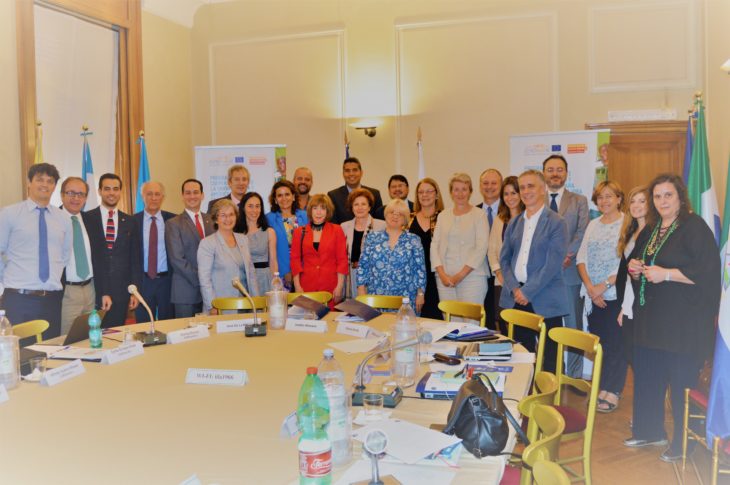This meeting was an opportunity for sharing the strategic lines of the programme in synergy with the social agendas arising from the bi-regional dialogue between the European Union and Latin America

EUROsociAL, in Rome, held the first meeting of the Steering Committee organised by the European Commission through its Directorate-General for Development and Cooperation (EuropeAid). This is the first meeting of this body in this new phase of the programme started in November 2016 under the name EUROsociAL+. Its value is essential for the programme that now constitutes a space for dialogue between stakeholders with extensive knowledge and experience in Latin America and in the bi-regional EU-LAC relationship, which provides inputs of great value for the strategic direction of the programme.
The event, opened by the General Secretary of the IILA, Donato di Santo, was structured around debate and dialogue based on the issues that concern all the institutions and participants in attendance in the Italian capital. Thus, the role of EUROsociAL+ in bolstering the social agenda in Latin America, the goals for advancing towards social cohesion and the definition of regional mechanisms for improved and stronger impact were some of the starting points for a productive exercise in joint reflection.
The long track record of EUROsociAL (created at the 2005 LAC-EU Summit in Guadalajara) made it possible to bring all the essential stakeholders of the European structure and of the social agenda in Latin America to the table. On the part of the European Commission, through its Directorate-General for Development and Cooperation (EuropeAid), the coordinators of the meeting were Paz Velasco-Velázquez and Eva Estaún, heading a list of participants that included the following: Nicola Murray from the European External Action Service; Paola Amadei from the EU-LAC Foundation; Nieves Rico and Gerardo Mendoza from ECLAC; Federico Bonaglia from the OECD Development Centre; Ferdinando Regalia and Carla Fernández-Durán from the IDB; Guillermo Dema from the ILO; on an individual basis, Josette Altmann (FLACSO), Clarisa Hardy (former Chilean minister) and José de la Mata (Spanish judge). And lastly, as representatives of the EUROsociAL consortium: programme director Juanma Santomé (FIIAPP); the coordinators of the policy area, Francesco Chiodi (IILA, social policy); Dominique de Suremain (Expertise France, gender) and Marisa Ramos (FIIAPP, governance), office coordinator of the programme, José Piqueras (FIIAPP); representatives of the Central American coordinating partner, SISCA; General Secretary Alfredo Suárez; and Cooperation Director Carlos Maza.
EUROsociAL, in Rome, held the first meeting of the Steering Committee organised by the European Commission through its Directorate-General for Development and Cooperation (EuropeAid). This is the first meeting of this body in this new phase of the programme started in November 2016 under the name EUROsociAL+. Its value is essential for the programme that now constitutes a space for dialogue between stakeholders with extensive knowledge and experience in Latin America and in the bi-regional EU-LAC relationship, which provides inputs of great value for the strategic direction of the programme.
The event, opened by the General Secretary of the IILA, Donato di Santo, was structured around debate and dialogue based on the issues that concern all the institutions and participants in attendance in the Italian capital. Thus, the role of EUROsociAL+ in bolstering the social agenda in Latin America, the goals for advancing towards social cohesion and the definition of regional mechanisms for improved and stronger impact were some of the starting points for a productive exercise in joint reflection.
The long track record of EUROsociAL (created at the 2005 LAC-EU Summit in Guadalajara) made it possible to bring all the essential stakeholders of the European structure and of the social agenda in Latin America to the table. On the part of the European Commission, through its Directorate-General for Development and Cooperation (EuropeAid), the coordinators of the meeting were Paz Velasco-Velázquez and Eva Estaún, heading a list of participants that included the following: Nicola Murray from the European External Action Service; Paola Amadei from the EU-LAC Foundation; Nieves Rico and Gerardo Mendoza from ECLAC; Federico Bonaglia from the OECD Development Centre; Ferdinando Regalia and Carla Fernández-Durán from the IDB; Guillermo Dema from the ILO; on an individual basis, Josette Altmann (FLACSO), Clarisa Hardy (former Chilean minister) and José de la Mata (Spanish judge). And lastly, as representatives of the EUROsociAL consortium: programme director Juanma Santomé (FIIAPP); the coordinators of the policy area, Francesco Chiodi (IILA, social policy); Dominique de Suremain (Expertise France, gender) and Marisa Ramos (FIIAPP, governance), office coordinator of the programme, José Piqueras (FIIAPP); representatives of the Central American coordinating partner, SISCA; General Secretary Alfredo Suárez; and Cooperation Director Carlos Maza.
EUROsociAL+



